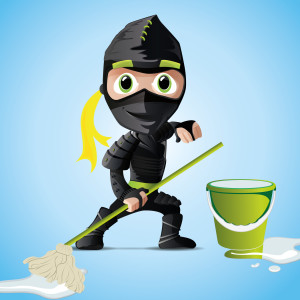Questions for a Language Ninja: The Weirdness of Everyday Expressions
Welcome to another edition of Questions for a Language Ninja, where the Ninja explores common grammar and usage issues that, hopefully, at least one other person will find important. Let’s get going!
Q: Why is it that common expressions like “cheer up,” “clean up,” “mess up,” “calm down,” and “make up” don’t have an opposite adverb equivalent? Shouldn’t we be able to logically say “clean down?”
A: We should, and we would – if English language usage was governed entirely by logic. Alas, it is not.
Yes, the terms “up” and “down” are adverbs, which should be used to indicate either a higher or lower position in relation to something. However, there is such a thing as linguistic evolution; a pesky, group-dictated phenomenon where all of us, as speakers, grudgingly agree that certain terms have developed additional meanings and usages that may or may not make sense. Case in point: The auto-antonym, also known as the contronym. We might all agree about the meaning of the adverb “off,” but depending upon the usage, it can mean either to deactivate or activate. So, to “turn off” is to deactivate something, while to “take off” is to activate something. For example, if we were to hear someone say: “Dude, when that guy at the ticket window said that the Monster Truck Jam wouldn’t accept my Groupon, I just went off,” we would immediately understand that the speaker didn’t just depart in a quiet and respectful manner. There might have even been a few defiled monster truck beds.
When it comes to the terms “up” and “down,” we’ve come to understand – through hundreds of years of nuanced usage – that the definitions are broad and largely philosophical. “Up,” when used as a modifier, can convey the following meanings:
- To ascend skyward. (“I walked up six flights of stairs. If you took the elevator, then I am better than you.”)
- To come to the fore. (“I moved up to the front of the line instantly at Disneyland, and all it took was a wheelchair rental.”)
- To endure. (“I’ve put up with your Disneyland wheelchair fraud for far too long!”)
- To become noticed, or arrive. (“Look who finally showed up! I almost think you don’t enjoy attending my 7 am team-building meetings.”)
- To begin. (“Lowell opened up the bait shop at 5 am for the morning rush, which subsided at 5:05 am.”)
- To end. (“The mustard is all used up. Your lack of preparation for the hot dog cook-off shames me.”)
- To shift into a 90 degree position. (“Sit up! Don’t Slouch! You look like you should be guarding a bell tower in Notre Dame!”)
“Down,” while absent of much of the variety of “up,” does have its own series of diverse meanings.
- To descend from a high position. (“Get down from that tree! That possum is looking kind of testy.”)
- To end. (“They shut down the fair after they found a squirrel in the Twinkie fryer.”)
- To begin. (“Let’s get down to business. Did the squirrel actually touch any Twinkies?”)
- To soothe. (“Calm down! Fried squirrel never killed anyone.”)
- To dance in a funky or groovy manner. (“We were too busy getting down in the disco tent to notice the chaos at the fried Twinkie stand.”)
Ultimately, the adverbs “up” and “down” modify the meaning of the phrases in ways that are difficult to describe to non-native speakers. We can ask someone to clean, but the act seems far more strenuous  than what “clean up” implies. To “clean” could possibly mean using solvents, scrub brushes and lots of elbow grease. “Clean up” is more likely to involve organizing, removing garbage and perhaps some light dusting. Good luck explaining this distinction to the aliens after the intergalactic apocalypse and enslavement.
than what “clean up” implies. To “clean” could possibly mean using solvents, scrub brushes and lots of elbow grease. “Clean up” is more likely to involve organizing, removing garbage and perhaps some light dusting. Good luck explaining this distinction to the aliens after the intergalactic apocalypse and enslavement.
So, the question remains: Is it correct to use the phrase “start up,” if we can’t also say “start down?” and the Ninja’s answer is: Sure. Of course, the Ninja always an advocate for relaxed common expression usage when its meaning is clear to essentially everyone, and when the most basic rules of grammar aren’t destroyed. Yes, there is the danger of being redundant; yes, it isn’t always economical to slap “up” or “down” on the end of the term. In the end, however, we’re only adding color and even creativity to the language, and that is always interesting.
Until next time – the Ninja is shutting up now.
Holly Troupe is a professional web content writer and an amateur everything else. She spends her days writing, eating, and looking for ways to incorporate the term “perfidy” into the urban vernacular.

